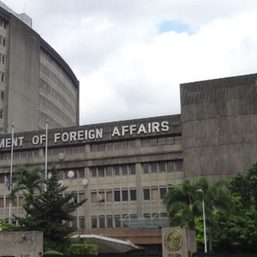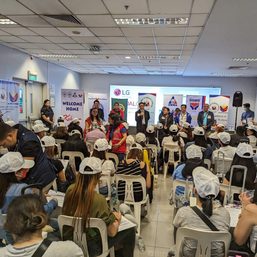SUMMARY
This is AI generated summarization, which may have errors. For context, always refer to the full article.

MANILA, Philippines – More than a week after the Islamist group Hamas attacked Israel, Filipinos working in the Jewish nation, were still unwilling to return home to escape the escalating violence in the Palestinian enclave of Gaza.
As of Monday, October 16, a few Filipinos – just 22 out of over 30,000 working in Israel – have expressed the desire to come back home to the Philippines. Of the 22, 17 will be arriving in Manila by Wednesday, October 18, according to the Department of Foreign Affairs (DFA).
DFA Undersecretary Eduardo de Vega, who handles migrant workers concerns, said there were two major factors to consider– first, most overseas Filipino workers (OFWs) in Israel are situated far from the hostilities in its southern areas, and second, Filipinos may feel a “connection” to Israel.
“Our kababayans are resilient. It is possible too that, being English-speaking and of Christian faith, they feel a connection to Israel which Thais do not. So they are comfortable with sticking it out instead of leaving the country,” said De Vega, when asked why he thinks so few want to exit Israel even as it plans to intensify strikes against Gaza.
In contrast to the 20 or so Filipinos who want to exit Israel, over 7,000 workers from Thailand, a southeast Asian neighbor, have said they wanted to return home. Repatriation efforts by Thailand are ongoing.
Department of Migrant Workers officer-in-charge Hans Cacdac, speaking to ANC on October 16, figured that Filipino workers might feel “safe and secure” in Israel despite the escalation of hostilities against Hamas.
The DFA earlier said that some 388 Filipinos in Israel reached out to the embassy there for assistance, but only a few were interested in repatriation – mostly because they had lost their jobs because of the Israel-Hamas war.
“Over the years, our [OFWs] have found a home in Israel, they feel safe and secure in that sense. The other matter is that most of our Filipinos [in Israel] are caregivers. Caregivers are human care workers and well known all over the world for their dedication,” he added.
Israel’s Deputy Chief of Mission to Manila, Esty Buzgan, told media in Manila that “Filipinos in Israel as the same as any other citizen, they call our grandparents mother and father and we treat them just like that – [they are] our kids, brothers, and sisters.”
A Filipino death, said Buzgan, is “like losing one of us”
The three Filipinos killed in Israel from the first day of Hamas’ surprise attack were all OFWs who worked as caregivers in Israel. One woman, whom the DFA refused to name but has since been identified as Angelyn Aguirre is remembered for staying by the side of her elderly employer, despite the threat of attack from Hamas. The DFA said both Aguirre and her employer were killed when Hamas barged into their home located at a kibbutz near the Gaza border.
“Filipinos are mostly in central and northern parts of Israel,” noted De Vega, who has also worked in the region before. At least three more Filipinos remained missing in Israel.
Yet observers have worried that tensions and violence in Israel may soon spread beyond its southernmost areas. Lebanon’s Hezbollah recently launched attacks in northern Israel, for instance, stoking fears that a new front would open up in Israel’s war.
The deployment of caregivers to Israel from the Philippines is on hold – but not because of the war against Gaza. Government-to-government talks are still ongoing to iron out certain issues – including how expensive it costs prospective Filipino caregivers to begin working in Israel. Those talks have stalled for the meantime, given the war.
The Philippines has no plans of raising the Alert Level in Israel, since the “situation there has stabilized.”
Gaza difficulties
The picture in Gaza is vastly different. The Palestinian territory is home to some 131 Filipinos – Filipinas who are married to Palestinians, as well as, their children and grandchildren. All 131 have been ordered to repatriate, after the Philippines placed Gaza under Alert Level Four.
Actually bringing them home is another issue altogether.
People inside Gaza are still practically trapped – both Egypt and Israel have refused to let refugees through, even as Israel warned people in Gaza to flee from its northernmost cities. The United Nations (UN) has slammed this 24-hour deadline, saying it would have “devastating humanitarian consequences.”
The Philippine Embassy in Cairo has a team on standby at the Rafah crossing, or the border between Israel and Gaza, should a humanitarian corridor be brokered.
“DFA is hopeful for a solution to be reached soonest in order for the Rafah crossing to start receiving foreign nationals, so that our kababayans in Gaza will be allowed to cross into Egypt. From there, our teams will work on their repatriation to the Philippines,” said DFA Secretary Enrique Manalo in a statement Monday, October 16.
United States Secretary of State Antony Blinken has promised that the Rafah crossing would reopen both to let aid in and to allow foreign nationals to exit. Yet both Hamas and Israeli officials have denied that a truce had been made. More than 2 million individuals are trapped in Gaza since Israel intensified bombardment and its blockade following the October 7 surprise attack.
A humanitarian corridor entails not just a physical space but a commitment from warring wides – in this case, Israel and Hamas – of a ceasefire for a limited amount of time.
The DFA has said that Philippine embassies in Cairo and Amman, which has jurisdiction over Gaza, are already preparing the travel documents and passports for the Filipinos in Gaza who want to return to Manila. They are uncertain, however, if the Palestinian spouses of Filipinas would be able to exit Gaza. – Rappler.com
Add a comment
How does this make you feel?


![[EDITORIAL] Ang ‘enemy from within’ sa West Philippine Sea](https://www.rappler.com/tachyon/2024/05/animated-disunited-front-carousel-2.jpg?resize=257%2C257&crop_strategy=attention)









![[Only IN Hollywood] Spider-Man’s Pinoy bestie beats Fall Guy; Fil-Am voices Pixar film character](https://www.rappler.com/tachyon/2024/05/only-in-hollywood-may-8-2024.jpg?resize=257%2C257&crop=314px%2C0px%2C720px%2C720px)
![[Vantage Point] Philippine economic reforms run into headwinds](https://www.rappler.com/tachyon/2024/05/ph-economic-headwind-may-2024.jpg?resize=257%2C257&crop_strategy=attention)

There are no comments yet. Add your comment to start the conversation.